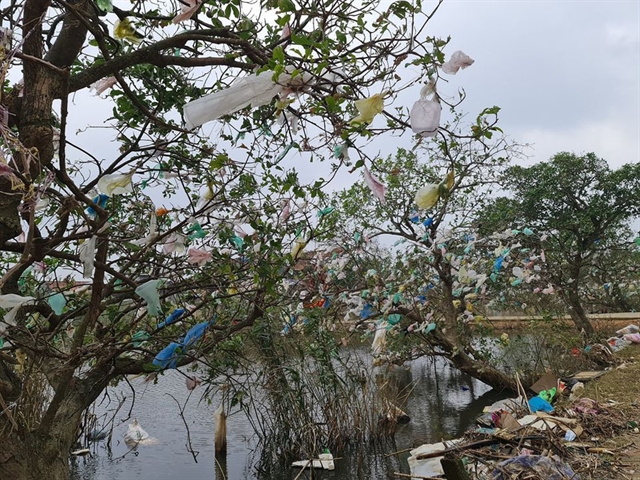 Society
Society

The volunteer group made a deal with the people of the village that for each kilogram of dry rubbish they brought to the co-operative, residents would be paid VNĐ30,000 (US$1.30). For each kilo of wet rubbish, they offered VNĐ20,000.

|
| Rubbish hung in the trees beside a road in the village. Photo vietnamnet.vn |
QUẢNG BÌNH — It was 9am on a morning earlier this month when a group of volunteers in pink uniform at Phú Thọ Village Cooperative in Quảng Bình Province used a loudspeaker to call on residents of the village to collect rubbish and sell it.
The volunteer group made a deal with the people of the village that for each kilogram of dry rubbish they brought to the co-operative, residents would be paid VNĐ30,000 (US$1.30). For each kilo of wet rubbish, they offered VNĐ20,000.
Hundreds of villagers flocked to the streets to collect rubbish.
Phú Thọ Village in An Thủy Commune was the area with the most rubbish after recent floodwaters receded. More than two weeks after the flood, village residents had barely managed to clean their houses and couldn’t afford to tend to public areas.
On both sides of the road, rubbish hung in tree branches. To remove the trash, people had to use poles of 3-4m long with nails attached to pull down plastic bags. One group climbed the trees to remove the rubbish, others rowed a boat to collect the rubbish stuck on the tree branches in the middle of the lake.
On the first day of the campaign, more than three tonnes of rubbish were collected by local people. The rubbish was then transported to the district’s trash gathering point and processed.
This is a campaign to clean up rubbish after the flood initiated by Quảng Bình Tourism Club. Trần Thi Thuỳ Dung, the chairperson of the club, said the idea of collecting rubbish came about by accident.
“One member of the club went to a remote area to support the people after the flood when they saw the rubbish scattered on the branches of the trees. Then he wondered if it was possible to pay people to collect rubbish.”
The club at the time had received a donation of VNĐ80 million from two philanthropists. They decided to go ahead with the idea.
“By paying people for trash collection, we want people first to clean up their living space, helping people be more aware of waste disposal. We also want to replicate this model to other groups and localities because we cannot collect all the waste in the area, ” she said.
During the collection process from 8am to 3pm, members of the club accompany the people to collect trash. At the end of the day, they rent a garbage truck to transport all the trash to the treatment point.
“We have to book two days in advance to rent a garbage truck because the waste treatment companies are very busy now,” Dung said.
The first day, some 400 people in the village collected three tonnes of rubbish. On the second day, more than 100 people from another village participated. This time, they collected more than a tonne of plastic bags.
Quang Binh Tourism Club is a group of 30 members. In the recent flood, members of the club cooked 17,000 meals to bring to people in need.
“We also visited more than 500 families with difficult circumstances, giving more than 10,000 gifts.”
Members of the group work in the tourism industry, so they also support charitable groups who came to support people in the area to get free rooms, trucks and meals.
“The most meaningful gift they gave people in flooded areas was bunches of vegetables. During the rainy season, vegetables and crops were damaged so much that the price of vegetables increased, even if there was money, there were no vegetables to buy,” Dung said.
Therefore, Quảng Bình Tourism Club called for sponsors to donate vegetables.
“The people who received the vegetables were very happy. They say they are not hungry for much, but a meal with green vegetables,” she said. — VNS




